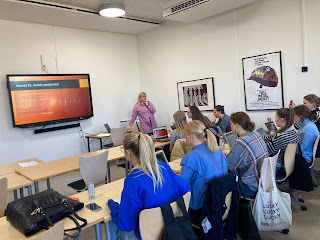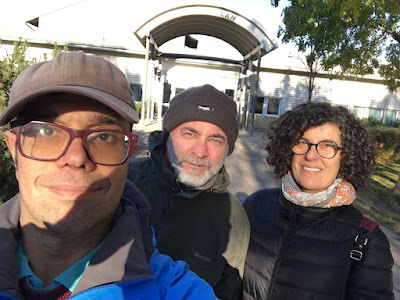La jornada ha comenzado de la mejor manera posible, ya que nuestros anfitriones han tenido el gran detalle de izar nuestra bandera junto a la danesa a la entrada del campus.

Después de este pequeño regalo que nos llena de sentimiento europeo y da sentido a este programa, Darío y Margarita han acudido a la primera clase del día: inglés de tercer grado, el último de Bachillerato en Dinamarca, con alumnos y alumnas de 18 años en adelante.
Durante un descanso, hablando con la profesora de la asignatura, nuestros compañeros se enteran de que la clase está dividida en dos grupos y que en ese momento en la clase sólo estaba una parte (9 alumnos concretamente).

Esto se debe a que los estudiantes han escogido ramas diferentes en su educación, escogiendo unos una rama más tecnológica y la lección que se veía hoy no era necesaria para su aprendizaje. Por tanto, estos alumnos se encontraban en un aula adyacente trabajando en grupos sobre la realización de una presentación en inglés sobre algún tema relacionado con la tecnología, convirtiéndose en "profesores por un día".
Además, en el caso de inglés y otras muchas asignaturas, los exámenes escritos han sido eliminados debido a la pandemia, realizándose muchos de ellos de forma oral, como en el caso de los idiomas. Parece, por tanto, una manera muy práctica de seguir evaluando al alumnado.
Posteriormente llega la primera clase de español a la que acuden Darío y Margarita. La profesora, Dorte Jonsson, está tratando el tema de la independencia de Cataluña entre su alumnado, que además van a viajar a Barcelona en dos semanas. El alumnado visualiza un documental sobre el tema y posteriormente preguntan sobre el tema a nuestros compañeros. Tanto a Margarita como a Darío les resulta muy interesante que traten un tema tan complejo políticamente en clase y los alumnos puedan conocer de primera mano la opinión de ambos.
 Al finalizar la clase le hacemos entrega de dos ejemplares de nuestra revista "El Barrio" para que conozcan de primera mano la labor que realizamos en nuestro centro y puedan utilizarlo como material de clase.
Al finalizar la clase le hacemos entrega de dos ejemplares de nuestra revista "El Barrio" para que conozcan de primera mano la labor que realizamos en nuestro centro y puedan utilizarlo como material de clase.
La última clase del día es la de Matemáticas de segundo grado, que nuestra compañera Margarita disfruta especialmente al ser de su especialidad. Aunque la clase se dé en danés, el idioma universal de los números hace que Margarita pueda seguir a la perfección la clase.
Finalmente, y después de un día tan productivo, Darío y Margarita utilizan las últimas horas de sol de la tarde para recorrer el puerto de Frederikssund y contemplar sus hermosos paisajes. Por el camino se topan con la reconstrucción de una típica aldea vikinga que puede visitarse en los alrededores del paseo del puerto.


Mañana continuaremos con el siguiente capítulo de esta magnífica experiencia para nuestros docentes españoles en Dinamarca.
The day has started in the best way possible, our hosts have had the great detail of raising our flag next to the Danish one at the entrance of the campus.
After this bonding act, which fills us with European sentiment and gives meaning to this program, Darío and Margarita attended the first class of the day: third grade English, last year of High School in Denmark, with 18-year-old students or older. During the break, talking with the teacher of the subject, our colleagues find out that the class is divided into two groups, and, at that moment, only one part was in the class (9 students). This is because the students have chosen different branches in their education, some choosing a more technological branch, and today’s lesson was not necessary for their field of study. Therefore, these students were in an adjacent classroom working in groups on making a presentation in English on some technology-related topic, becoming "A teacher for a day."
In addition, in the case of English and many other subjects, written exams have been eliminated due to the pandemic, many of them being taken orally, as in the case of languages. It seems, therefore, a very practical way to continue evaluating students.
Later, they attend the Spanish class. The teacher, Dorte Jonsson, is discussing the issue of the independence of Catalonia with her students, who are also going to travel to Barcelona in two weeks. The students watch a documentary on the subject and later ask our colleagues about it. Both Margarita and Darío find it very interesting that they deal with such a complex political issue in class, and the fact that students can learn first-hand the opinion of both.
At the end of the class we give them copies of our magazine "El Barrio", which can be used as class material as well as help to learn about the work we do at our school.
The last class of the day is second grade Mathematics, which our colleague Margarita especially enjoys as it is her specialty. Although the class is given in Danish, the universal language of numbers allows Margarita to perfectly follow the class.
Finally, and after such a productive day, Darío and Margarita use the last hours of the afternoon sun to tour the port of Frederikssund and enjoy its beautiful landscapes. Along the way, they come across the reconstruction of a typical Viking village that can be visited around the harbor promenade.
Tomorrow we will continue with the next chapter of this magnificent experience for our Spanish teachers in Denmark.















































